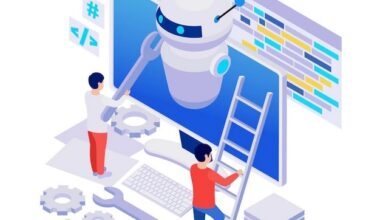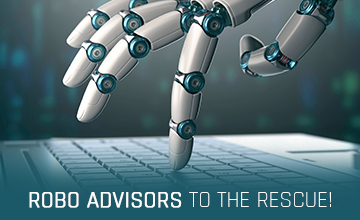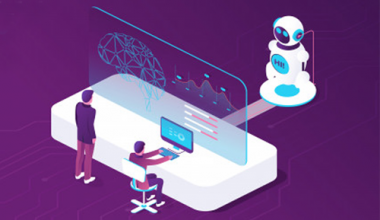
Artificial Intelligence has an immense influence on various industrial or manufacturing sectors, together with aviation, manufacturing, technology, and others. The features of Artificial Intelligence like machine learning and deep learning will generate higher productivity.
Artificial intelligence becomes a long way in the past few years, connecting the gap between technical conversations and what are now practical possibilities, and nowhere are the possibilities more exciting than in the automotive industry.
Between the designs of the cars, we currently drive and the process of manufacturing them, there are a lot of opportunities for Artificial Intelligence to develop, create efficiencies and make the process of auto-making and driving safer overall.
But one manufacturer which is already seeing exciting changes from Artificial Intelligence in the automotive industry. Artificial intelligence is introducing entirely new ways for an individual to get around.
It will soon become create a significant impact on how cars are manufactured. And it will soon have an influential impact on how cars are produced and will change how the traffic is maintained in the cities, here’s how
Autonomous Vehicles
While imagining the potential of artificial intelligence, top of mind for many are autonomous vehicles or independent vehicles, which operate with insignificant interference from human drivers.
Artificial intelligence processes are now synthesizing data in order to learn how best to react and how humans respond to driving situations. For automobiles, this includes predicting how other cars will behave, how to gauge weather conditions, understanding road issues, and more.
Ultimately, this could develop many automotive-driven productions, from taxis and sharing vehicles to transportation businesses and public transport.
Vehicle manufacturers are also looking to Artificial Intelligence to help people avoid human errors that lead to accidents. For example, safety features linked to automatic braking, collision avoidance systems, pedestrian and cyclist alerts, cross-traffic alerts, and intelligent cruise controls are some of the other features being powered by Artificial Intelligence.
By working as an assistant to a human driver, these artificial intelligence advancements benefit everyone on the road.
Cloud-based intelligence
Cloud computing and cloud-based intelligence through Artificial Intelligence occupy the capability to integrate many of the features of a consumer’s experience with their vehicle.
Big Data, advanced analytics, and other top technological programs are already growing together with Artificial Intelligence to help automotive manufacturing industries produce vehicles that essentially act as a control center for all information driving-related.
For example, cloud-based intelligence through Artificial Intelligence has the potential to enable drivers to place a take-out order at a restaurant based on their location or proposed driving the route to allow motorists to place their order well advancing time.
Internet of Things
By the year 2020, manufacturing analysts estimate over 250 million vehicles are connected to the technology. These vehicles are implemented with a myriad of sensors, secured connectivity programs, geo-analytical abilities, and alternative strategies for incorporating massive Data as a baseline of operations.
As such, the Internet of Things principle will enhance a critical link in integrating these disparate systems into a unified operating program.
What will this mean for automotive production companies? It suggests that manufacturing companies can need to work more closely with software developers and other players in the software industry to successfully combine these smart systems into new vehicles and secure effective links between those systems.
This implies the potential for brand new partnerships and an extension of current partner networks, which may lead to exciting business opportunities.
Driver Assist Features
There are some companies that are working on fully autonomous and a lot of manufacturers are shifting in that way. The companies are advancing features that can assist the drivers without taking the wheel; the companies are putting more effort into Artificial Intelligence-based technology that can better vehicles by high-level security benefits.
Likewise, automated braking systems, collision avoidance systems, pedestrian and cyclists alerts, cross-traffic alerts, and smart cruise directions are a few of the lesser features being powered by Artificial Intelligence.
Biometrics
Another significant contribution to artificial intelligence is making is the use of biometrics to analyze driver security. This kind of technology would require a car to drive only when it recognizes a certain voice, which could be used to increase safety in ridesharing.
Artificial intelligence could also track and synthesize biometric data about alertness and attention, preventing possible accidents when the vehicle senses the driver is unsafe to operate it.
The common thread through all of these applications is the increased safety of everyone on the road; this is a trend in Artificial Intelligence development, and will likely be the focus for the foreseeable future.
Ideas like vehicle-to-vehicle technology, where connected cars will have the ability to communicate with one another, are being developed; this technology could reduce accidents by connecting vehicles, alerting the network when something goes wrong, and allowing drivers or even the vehicles to take preventive measures.
Also Read:
How Can Blockchain Benefit The Automotive Industry?
Improvements in manufacturing
Artificial Intelligence will benefit companies to make a better quality output and identifies errors completely better than human Artificial Intelligence could also be performed in demand forecasting and can decrease inventory cost.
Artificial Intelligence will improve automobile companies how vehicles are manufactured and how inventory is maintained and quality control will also increase. This could also help in improving the machinery life by 20% and machinery inspection costs will also reduce and annual maintenance will be reduced.
CONCLUSION
The manufacturing process could be reinvented with Artificial Intelligence so much so that human labourers are no longer needed, at least not to perform the same jobs.
Robotics and Artificial Intelligence processes could eventually replace the need for low-skill workers, which of course has the potential to negatively impact the labor force in the short term. In the long term, the idea is to re-train those workers for higher-level tasks.
Artificial intelligence surely will bring essentially change to the automotive industry, Artificial Intelligence will increase efficiency, safety, and productivity spelling out an eventuality that may totally defy our present perception of how the industry works.
Some vehicles will soon include their own Wi-Fi hotspots, which will provide internet connectivity using cell carriers. The smart decision for vehicle manufacturers is to consider the support of leveraging artificial intelligence technologies to improve their day-to-day processes, future outlooks, and overall success.
Fusion Informatics is one of the best Artificial Intelligence Company in India, developing different applications for various industries including Automotive Industry, using the latest AI frameworks and offering services on Artificial intelligence, Machine learning, Deep learning, data science, and more. AI applications that help to improve your business in the competitive world.
Reach us at [email protected] to know more about Artificial intelligence.






